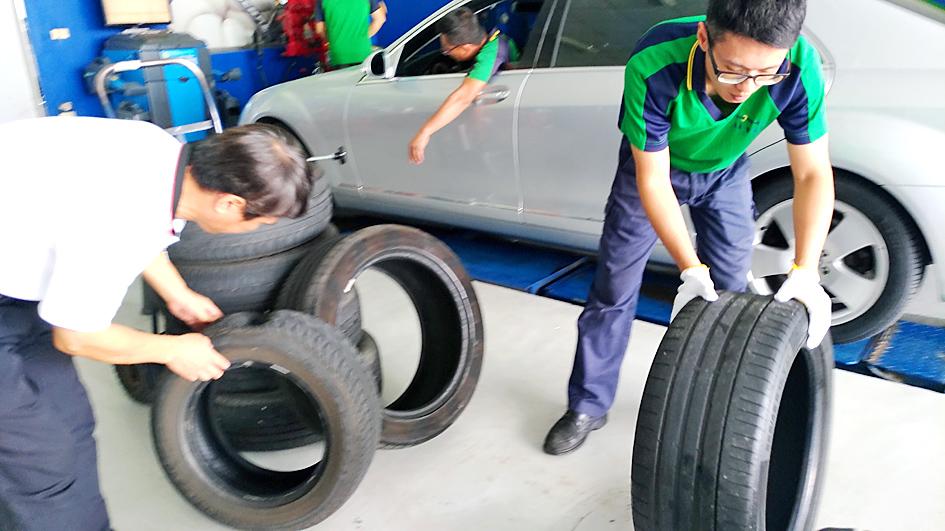Suppliers of automobile and truck tires from Taiwan and three other countries are facing anti-dumping tariffs after US authorities upheld a preliminary ruling accusing them of selling products at unfairly low prices in the US.
The decision by the US Department of Commerce released on Monday states that anti-dumping tariffs of 14.62 to 101.84 percent would be imposed on tire makers from Taiwan, South Korea, Thailand and Vietnam, with Taiwan facing the highest penalties.
Cheng Shin Rubber Industry Co (正新橡膠) and Nankang Rubber Tire Corp (南港輪胎), the two mandatory Taiwanese respondents, face anti-dumping tariffs of 20.04 percent and 101.84 percent respectively, while other Taiwanese exporters face an 84.75 percent penalty.

Photo: Liao Shu-ling, Taipei Times
The department would impose tariffs of 14.62 to 21.09 percent on tire exporters from Thailand, 14.72 percent to 27.05 percent on South Korean exporters, and zero to 22.27 percent on tire makers from Vietnam.
Another step is required before the anti-dumping tariffs can take effect. The US International Trade Commission (ITC) is also studying imports of tires from the four nations, and its commissioners are scheduled to conclude their investigation on June 23 and vote on whether to uphold the case.
The department is to forward its final results to the ITC for consideration. Some changes were made to the tariffs in the department’s final review.
Cheng Shin’s dumping duty was 52.42 percent after the preliminary review, but it was lowered by more than half to 20.04 percent, while Nankang Rubber’s penalty was raised to 101.84 percent, from 98.44 percent.
The tariffs for all other Taiwanese exporters fell slightly to 84.75 percent, from 88.82 percent.
The Taiwan Rubber & Elastomer Industries Association said that it was surprised by the latest ruling, as no Taiwanese tire makers intended to dump their products on US markets.
During the department’s investigation, Taiwanese respondents provided material to show they were not selling their products at unfair prices, but they still received the stiffest penalty, which could hurt Taiwan’s competitive edge, the association said.
The tariffs could prompt firms to relocate their production lines to other countries to avoid the tariffs, with workers in Taiwan bearing the brunt of the US measure, it said.
Nankang Rubber earlier said that it would ship passenger vehicle and light truck tires to the US from its Zhangjiagang plant in China’s Jiangsu Province instead of its production base in Hsinchu County’s Sinfeng Township (新豐).
However, tire products not affected by the ruling would still be shipped from the Sinfeng plant to the US, and production would be expanded, the company said.
Cheng Shin said that passenger vehicle and light truck tires account for less than 2 percent of its total sales.

Taiwanese suppliers to Taiwan Semiconductor Manufacturing Co. (TSMC, 台積電) are expected to follow the contract chipmaker’s step to invest in the US, but their relocation may be seven to eight years away, Minister of Economic Affairs J.W. Kuo (郭智輝) said yesterday. When asked by opposition Chinese Nationalist Party (KMT) Legislator Niu Hsu-ting (牛煦庭) in the legislature about growing concerns that TSMC’s huge investments in the US will prompt its suppliers to follow suit, Kuo said based on the chipmaker’s current limited production volume, it is unlikely to lead its supply chain to go there for now. “Unless TSMC completes its planned six

Intel Corp has named Tasha Chuang (莊蓓瑜) to lead Intel Taiwan in a bid to reinforce relations between the company and its Taiwanese partners. The appointment of Chuang as general manager for Intel Taiwan takes effect on Thursday, the firm said in a statement yesterday. Chuang is to lead her team in Taiwan to pursue product development and sales growth in an effort to reinforce the company’s ties with its partners and clients, Intel said. Chuang was previously in charge of managing Intel’s ties with leading Taiwanese PC brand Asustek Computer Inc (華碩), which included helping Asustek strengthen its global businesses, the company

Power supply and electronic components maker Delta Electronics Inc (台達電) yesterday said second-quarter revenue is expected to surpass the first quarter, which rose 30 percent year-on-year to NT$118.92 billion (US$3.71 billion). Revenue this quarter is likely to grow, as US clients have front-loaded orders ahead of US President Donald Trump’s planned tariffs on Taiwanese goods, Delta chairman Ping Cheng (鄭平) said at an earnings conference in Taipei, referring to the 90-day pause in tariff implementation Trump announced on April 9. While situations in the third and fourth quarters remain unclear, “We will not halt our long-term deployments and do not plan to

TikTok abounds with viral videos accusing prestigious brands of secretly manufacturing luxury goods in China so they can be sold at cut prices. However, while these “revelations” are spurious, behind them lurks a well-oiled machine for selling counterfeit goods that is making the most of the confusion surrounding trade tariffs. Chinese content creators who portray themselves as workers or subcontractors in the luxury goods business claim that Beijing has lifted confidentiality clauses on local subcontractors as a way to respond to the huge hike in customs duties imposed on China by US President Donald Trump. They say this Chinese decision, of which Agence